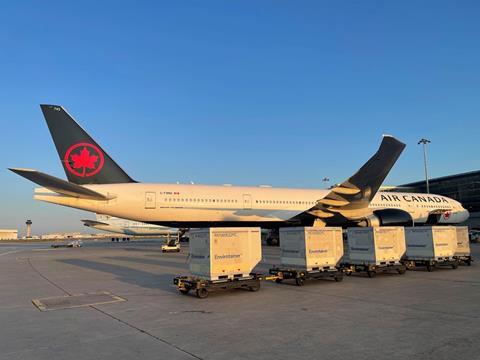
Air Canada is investing $16m in expanding and enhancing its cold chain handling facility at Toronto Pearson International Airport.
The expanded facility will feature over 30,000 sq ft of temperature-controlled areas and an expanded cooler to fully meet the requirements of cold chain shipments such as pharmaceuticals, fresh food and other perishables.
The cooler will have increased capacity for both ULDs and loose shipments with 2°C to 8°C and 15°C to 25°C temperature requirements, provide additional racking, and an upgraded dedicated area for active temperature control units.
"These enhancements are the first step in a multi-year investment plan for the facility and are part of several planned infrastructure investment projects for Air Canada Cargo," the company explained.
Jason Berry, vice president, cargo, at Air Canada, said: "This is another important step for Air Canada Cargo as we continue to grow our business and invest in our facilities to better serve our customers.
"Our new temperature-controlled facility, which will be the only one of its kind for a Canadian airline, represents a significant addition to Air Canada's on-site capabilities at Toronto Pearson and to Canadian cold chain logistics.
"It will also give Air Canada Cargo a strategic advantage at our main hub, which handles more than 60 per cent of all our traffic, and will support the launch of routes to be served by our new freighter aircraft."
The project also includes the installation of energy efficient equipment such as temperature controllers that monitor the conditions inside the facility.
The investment comes as Air Canada Cargo is in the process of adding freighters to its fleet.
The airline is converting eight Boeing 767-300ER aircraft into dedicated freighters, with the first due to enter service in the final quarter of the year to provide additional capacity for the peak season.
"Starting in early 2022, the first freighter will fly primarily out of Toronto and operate to Miami, Quito, Lima, Mexico City and Guadalajara, with additional cities like Madrid and Frankfurt, Halifax and St. John's connecting to the freighter network when the second aircraft is delivered in 2022," the airline said.
"The addition of freighter aircraft to Air Canada's fleet will allow Air Canada Cargo to provide consistent capacity on key air cargo routes, which will facilitate the movement of goods globally."
Matthieu Casey, senior director, cargo global sales and revenue optimisation, added: “Investing in our cold chain handling capabilities is a critical part of our strategy and expansion plans.
“We have made many changes and improvements to our pharmaceutical and perishable handling solutions in recent years, many driven by the CEIV Pharma certification process, but also driven by working with our customers to understand their specific requirements.
"In 2020, our operations teams also undertook a sweeping preparatory exercise to ensure we met the criteria for transporting Covid-19 vaccines.
"A state-of-the-art cold chain facility in Toronto is the next logical step, and fully aligns with the roll out of our initial freighter network, which will serve strong perishable markets like Miami, Quito, Lima, Mexico City and Guadalajara. It will of course significantly also improve our overall offering to all forwarders who specialize in cold chain shipments.”















